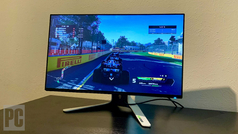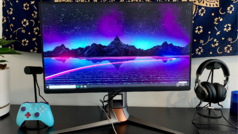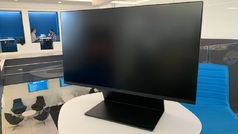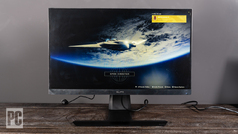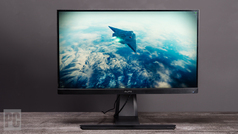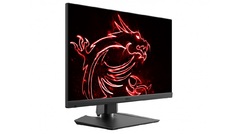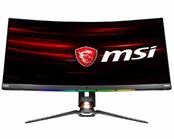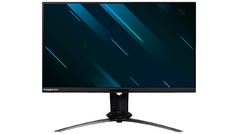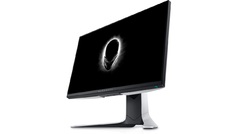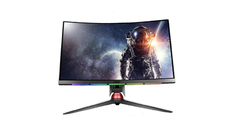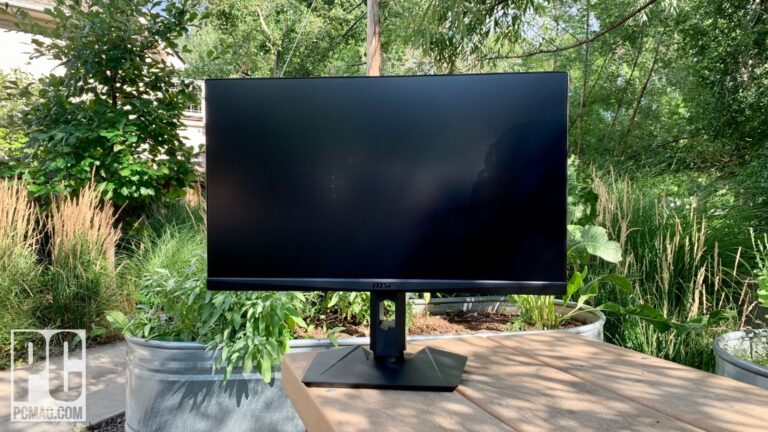
[ad_1]
What is a gaming monitor supposed to do? First and foremost for most buyers, it should—”duh, obvious” alert!—game well. But many shoppers want the whole package in their purchase: good gaming and media viewing, all in a single panel at a price that doesn’t exact a huge premium over a mainstream entertainment display. Alas, by trying to please multiple parties, MSI’s $299.99 Optix MAG274R2, a new 27-inch panel with a gaming bent, stumbles in both departments. We noted a washed-out, choppy image during our games testing. The price is aggressive for a gaming panel at its size, and its input lag reading is excellent, which keeps it at the three-star line. It’s a fair choice for a budget gaming panel, but you can do better at this size (and cheaper!) with the likes of the Dell 27 Curved Gaming Monitor (S2721HGF).
Highly Adjustable, Inside and Out
With a 27-inch display running at 1,920 by 1,080 pixels native and a peak refresh rate of 165Hz, the Optix MAG274R2 features a basic, straightforward design, in line with its price point (relatively speaking, that is—more on that in a minute).
The monitor sits on an all-black standpost that ends in a flat, rectangular, and sturdy base. The stand lets the screen slide up and down by just over 6 inches, tilt forward and back (from -5 to 20 degrees), and swivel left and right (75 degrees either way). The whole unit weighs 19.2 pounds assembled, while the display portion itself is 13.4 pounds, making it a good choice for anyone with a VESA mount rated for lower weights.
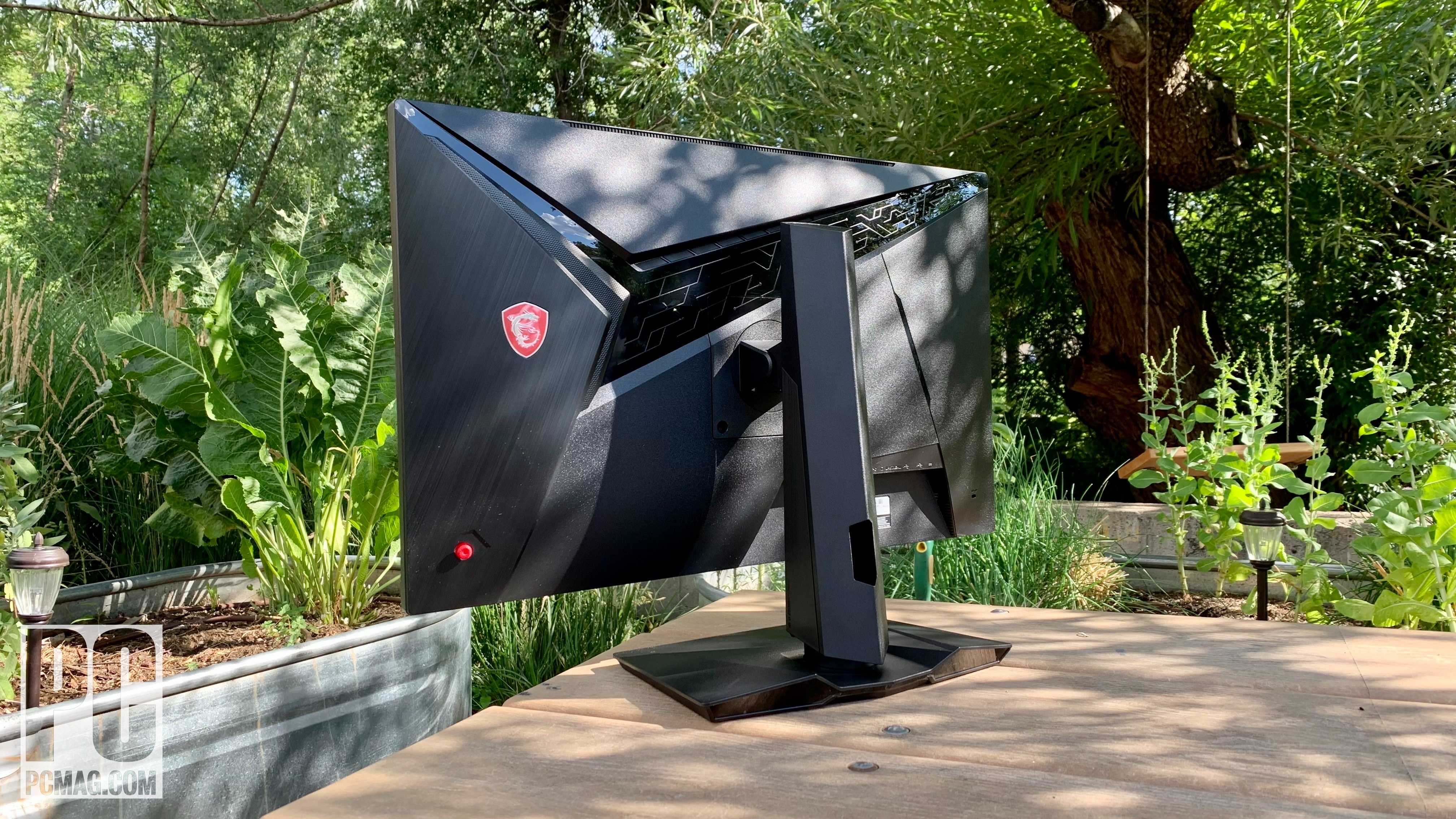
(Photo: Chris Stobing)
The monitor also pivots 90 degrees between landscape and portrait mode, unusual for a lower-cost gaming panel. Overall, the MAG274R2 is a highly ergonomic monitor, and it should fit on almost anyone’s desk or wall with ease.
Similar Products
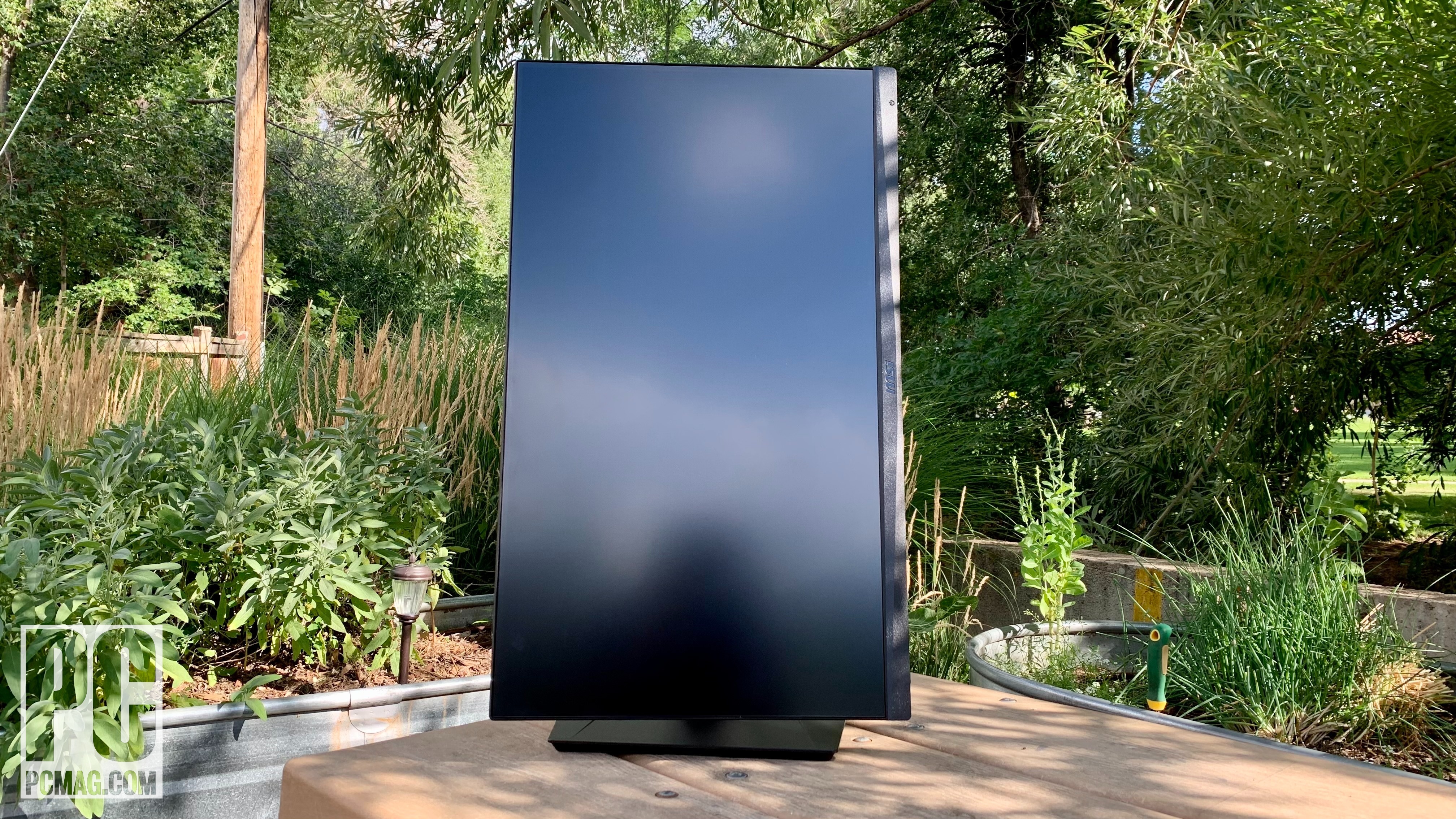
(Photo: Chris Stobing)
Each of the lights lining a diagonal strip along the back of the monitor’s casing is RGB-ready and customizable either using the responsive onscreen display (OSD) menu (it’s controlled by a five-way joystick on the back), or via the MSI Gaming OSD(Opens in a new window) software suite. To use the software, the display needs to be connected to your PC via an upstream USB 2.0 port on the back of the unit.
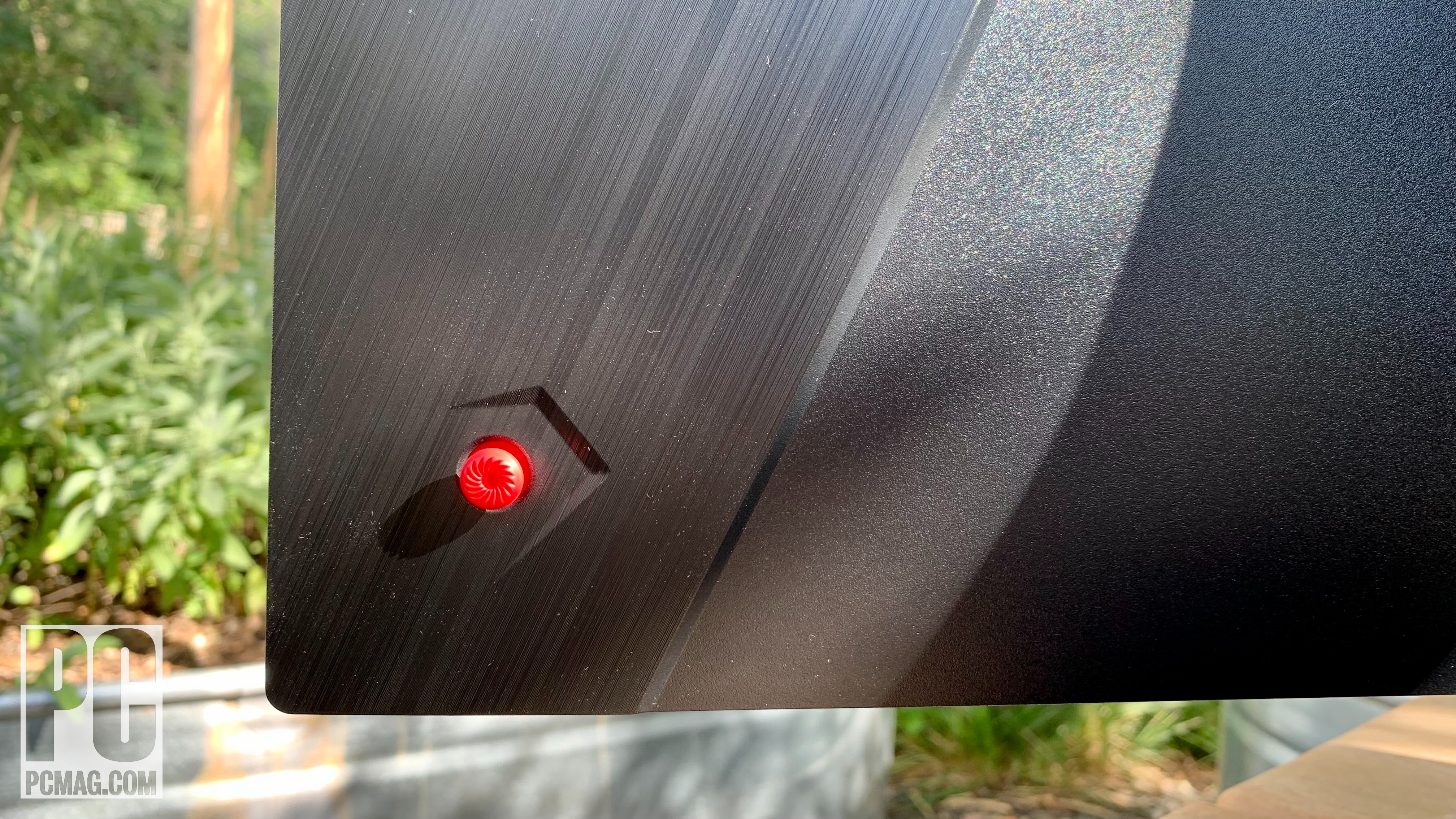
(Photo: Chris Stobing)
MSI’s onboard menu is deep with customization options and prebuilt profiles to select among. This includes three different gaming modes (RTS, FPS, Racing), as well as both a Professional mode for color work, and a Movie mode for watching content.
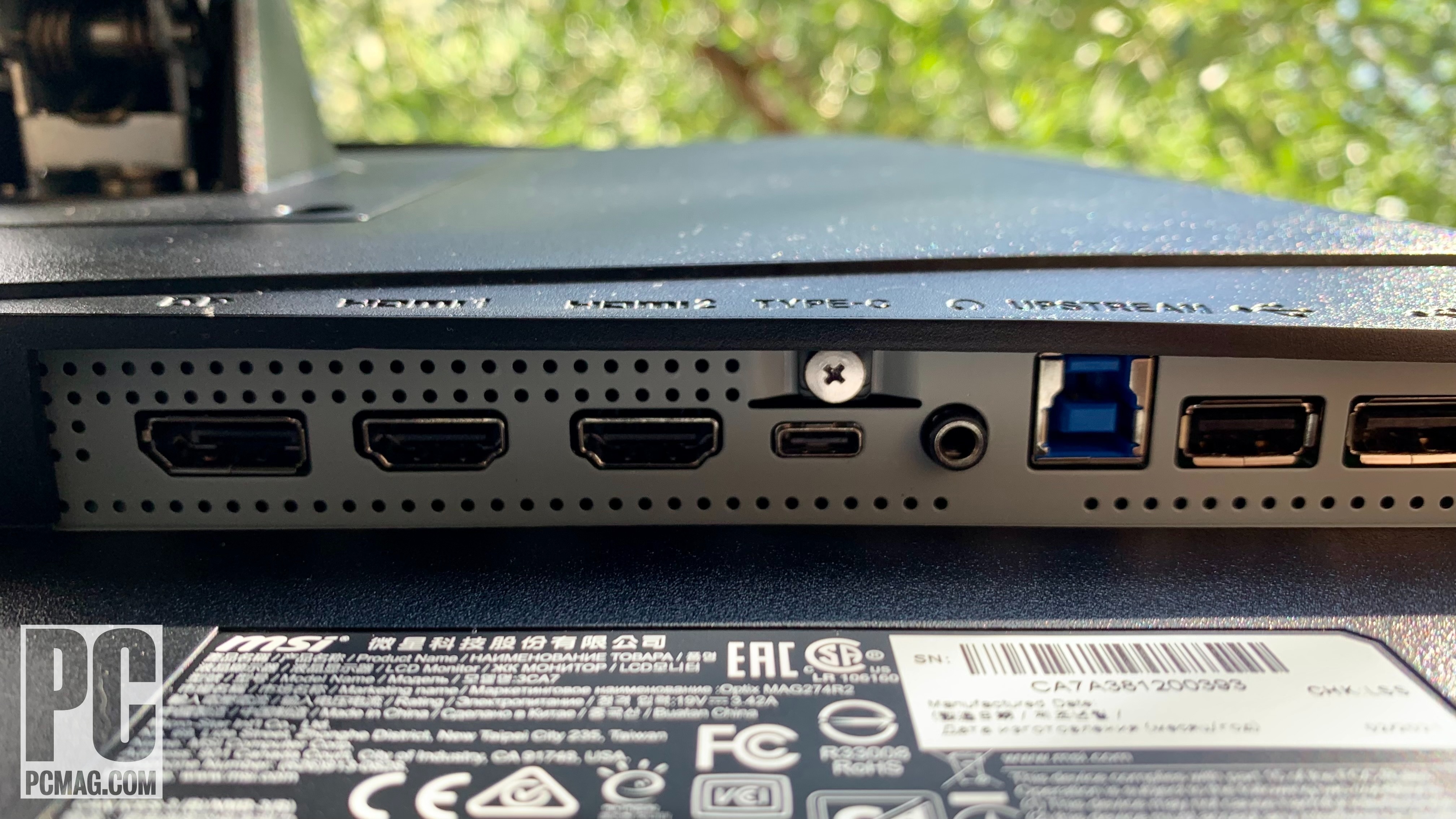
(Photo: Chris Stobing)
While the power button is just below the OSD joystick, most of the ports are offset to the back left corner of the monitor. These include two HDMI 2.0 ports, a DisplayPort 1.4b input, an upstream USB 2.0 Type-B port, two downstream USB 2.0 Type-A ports, a USB-C port (display-ready), a 3.5mm headphone jack for audio passthrough via HDMI, and the connector for the power brick.
Testing the Optix MAG247R2: Can’t Be All Things to Everyone
The 1080p display is built on a standard IPS panel (note the lack of “Fast” or “Rapid” there) with a native refresh rate of 165Hz. It’s billed as “HDR-ready,” which basically means it can accept an HDR signal then downscale it to SDR, and it is G-Sync Compatible along with support for AMD FreeSync (no “Premium” or “2” at the end of that latter qualification).
We test monitors with a Datacolor SpyderX Elite(Opens in a new window) colorimeter, a Murideo SIX-G(Opens in a new window) signal generator, and Portrait Displays’ CalMAN 5(Opens in a new window) software. Here is what we saw…
In the Standard picture mode with an SDR signal, the MAG274R2 showed a surprisingly high peak brightness reading of 374.2 nits (the display is rated for just 300 nits), and a black level of 0.33 nit, working out to a contrast ratio of 1,150:1, well above its rated 1,000:1. These numbers didn’t change significantly in other picture modes such as FPS, Racing Mode, or Cinema. (See more about how we test monitors.)

However, turning on the HDR setting (remember, this is simulated HDR) did the inverse of what you’d expect, dropping the nits measure down to just 223.4. (Because the HDR is simulated, it’s not mapped in the chart above.) Don’t use this mode if you can avoid it. It serves more of a marketing purpose than improving the picture quality of your games, movies, or TV shows.
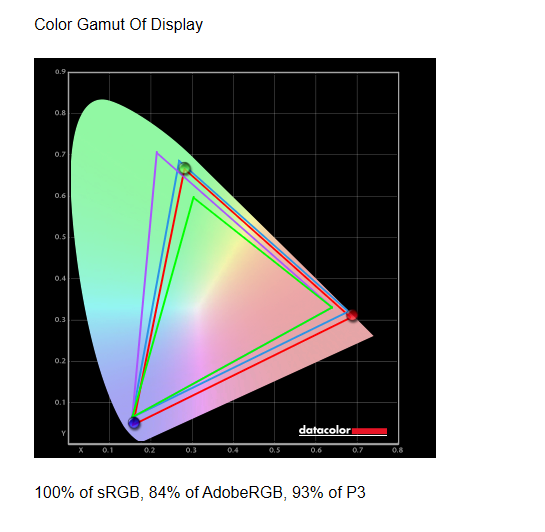
Moving along to the color results, the Optix covered 100% of the sRGB gamut and also hit some high marks in DCI-P3 at 93% coverage, making it a solid enough pick for both gamers and content lovers from a color-coverage perspective. The AdobeRGB gamut returns were higher than average as well (84% coverage), which is more than most gaming panels but still below what a professional content creator should look for in their next monitor.
Finally, the MSI Optix MAG247R2 surprised us yet again with strong results in our color accuracy testing, posting just a 0.91 Delta-E rating in our short run using the default settings out of the box…
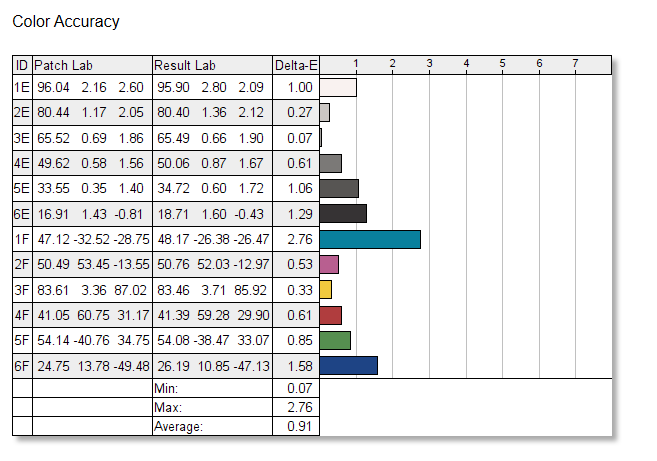
Many gaming monitors can hit under 2.0, but under 1.0 is an achievement. If you work with color-sensitive materials, a calibration session using the six-axis customization under the OSD might bring this figure down even further.
Media and Gaming Performance
Now, on to the media and gaming benchmarks. This is an area where display technologies like IPS both shine and struggle, with superior image quality but also slower response times and the potential for ghosting and artifacts in high-frame-rate scenarios.
In HDR, our 4K Costa Rica test footage(Opens in a new window) (output at 1080p to match the monitor’s native resolution) was basically a non-starter, since this isn’t a true HDR monitor and the scaled-down signal couldn’t hold a candle to even the most basic HDR400 implementations. Red Dead Redemption 2, meanwhile, with HDR turned on or off, looked okay, but not as good as what I’ve come to expect from IPS panels in 2021.
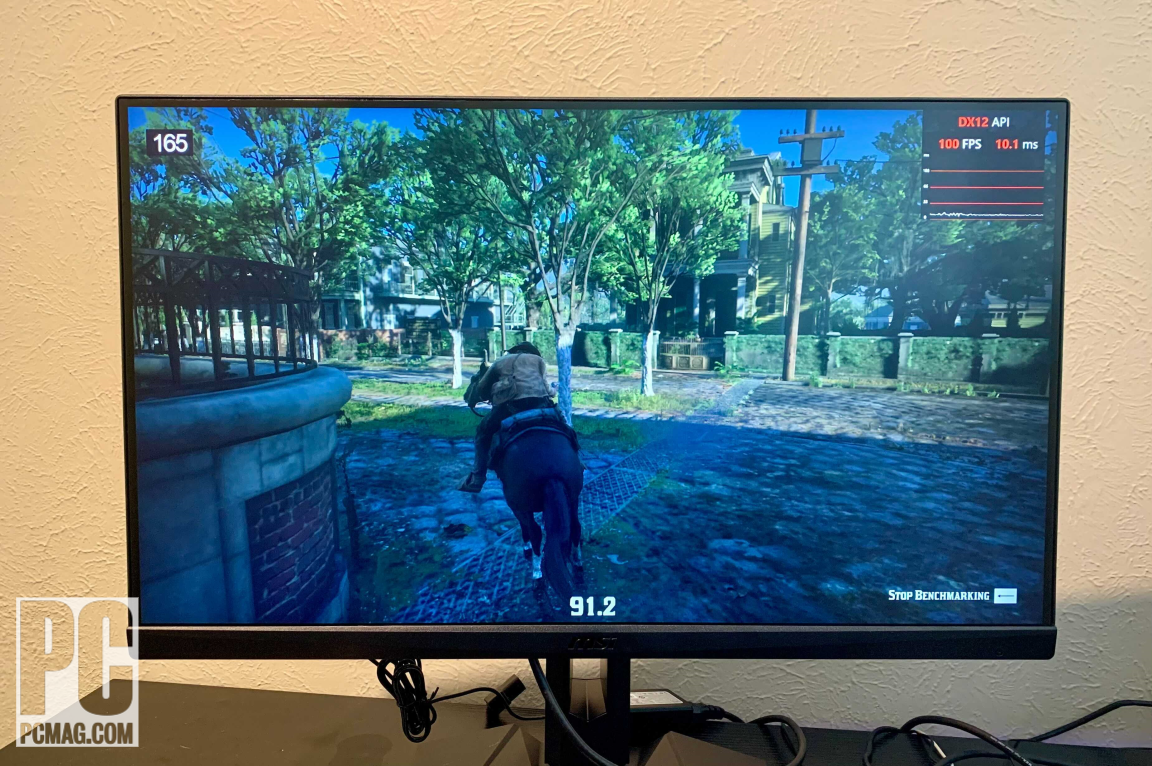
(Photo: Chris Stobing)
As for testing traditional input lag (the amount of time between when a monitor receives a signal and the screen updates), we test that with an HDFury 4K Diva HDMI matrix(Opens in a new window). With a 60Hz test signal, the Optix actually outran our lag tester, as it was so quick that the LED diode couldn’t even pick up a signal. Until now, the fastest model we’d tested was MSI’s ultrawide esports option, the Optix MPG341CQR, with an input lag result of 1.4ms. When testing the MAG274R2, our tool returned the error message “Result under 1ms, please check sensor position.”
After running the test again on another monitor next to the MAG274R2, we saw an expected result of around 5ms, which leads to the conclusion that MSI’s latest Optix posts at least under 1ms of input lag. However, just how much will remain a mystery until our testing tech catches up.
Speaking of gaming performance, with G-Sync Compatibility on board and input-lag figures like those above, I was expecting good things from the MAG274R2 once it came time to see how it handled fast-paced options like Counter-Strike: Global Offensive. But I was disappointed to see severe ghosting issues throughout my time in that game, as well as in a few rounds of Overwatch.
The problem was bad enough that I was regularly missing critical whip shots that could make or break a round in competitive play. (Good thing I was just up against some bots.) Even with that advantage, though, the ghosting was still a big enough issue that despite this monitor’s strengths as a gaming display in terms of input lag, it ultimately meets defeat. (Just like you might, if you rely on it to help you climb any ranked online ladders.)
Verdict: Exorcise Your Ghosts
The Optix MAG274R2 is a well-priced entry into the IPS gaming space, with incredibly low input lag and a generous feature set for the money. But its problems with ghosting in high-frame-rate gaming make it difficult to recommend to serious gamers on a budget. Anyone who’s all about esports gaming—and who wouldn’t be, if you’re considering a display like this—shouldn’t pick the MAG274R2, as its ghosting issues are significant enough to actually hurt your gameplay rather than help it.
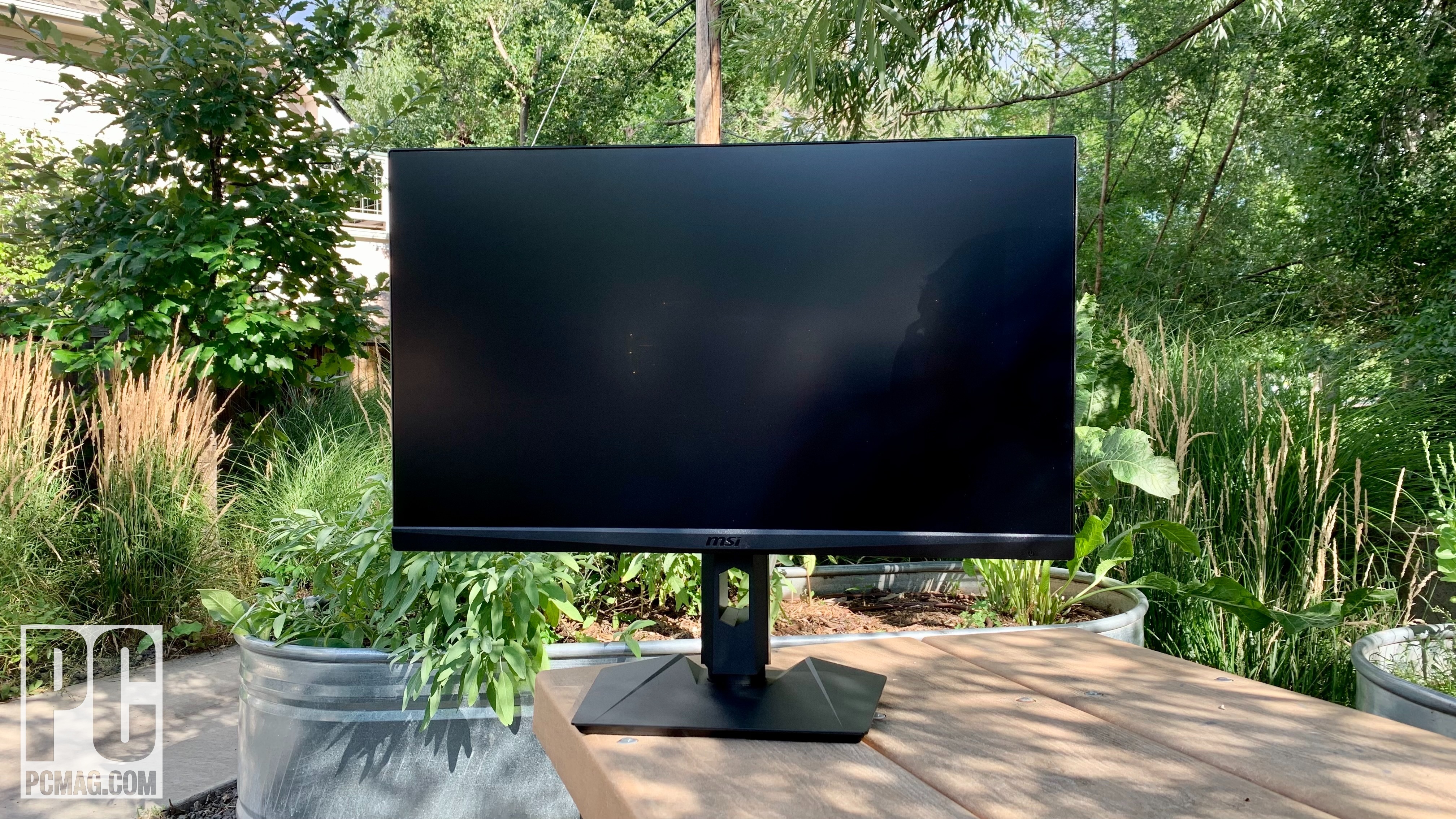
(Photo: Chris Stobing)
However, if you’re on the hunt for an IPS panel with HDR-lite that’s good enough for watching movies or playing AAA titles at 60fps, the MAG274R2 is okay. Its limited HDR implementation leads to a muddy, washed-out viewing experience with the feature turned on, and content was otherwise muted with it off. If an IPS panel can’t look good on top of going fast, why use one at all?
Instead, if you’re set on getting an IPS panel for the visual quality but also need some speed to match, you can find slightly more expensive options featuring Nano, Rapid, or Fast IPS displays (like the MSI Optix MAG274QRF-QD) that don’t compromise. Otherwise, stick with a TN or VA panel that can keep up with the speeds of games like Counter-Strike or Valorant. It may not look as good doing it, but at least you’ll be able to nail a clean shot every time without worrying about previous frames ghosting over the current image.
3.0
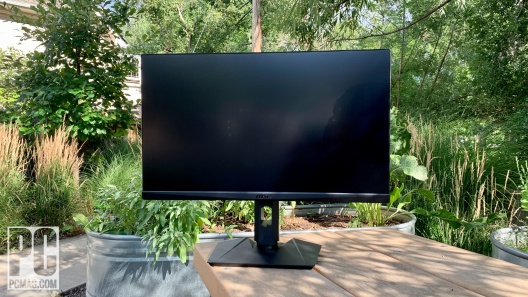
(Opens in a new window)
(Opens in a new window)
View More
MSI’s Optix MAG274R2 delivers impressive color results for the money, but some ghosting problems keep this panel from its ideal destiny: crisp and responsive gaming.
[ad_2]
Source link : https://www.pcmag.com/reviews/msi-optix-mag274r2
